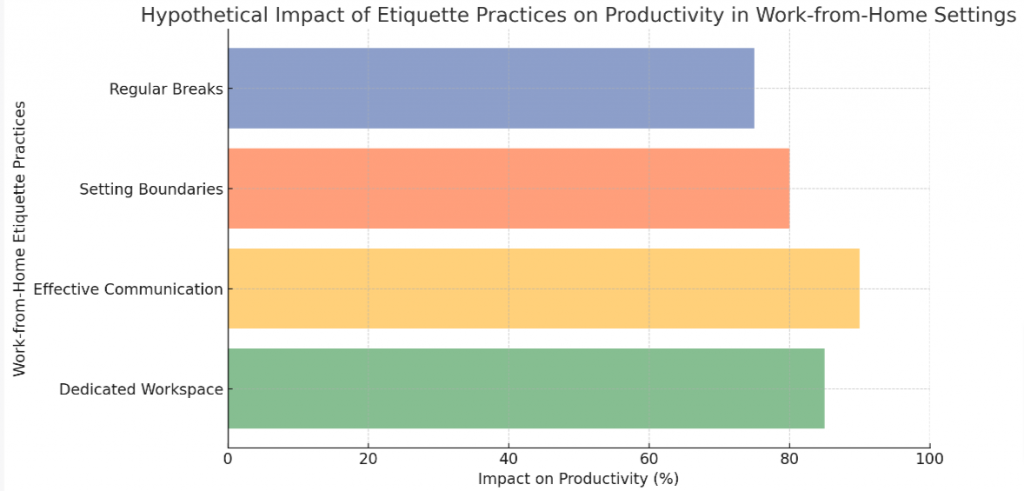Achieving Professionalism Online: Etiquette Tips for Social Media Jobs
Working from home in a social media job can present its own unique challenges. Did you know over half of workers consider using social media while working unprofessional? This article will guide you through mastering the art of work-from-home etiquette, especially tailored for those in socially-oriented roles.
Let’s transform your remote workspace into a productive and professional haven!
Key Takeaways
- Creating a dedicated workspace is crucial for maintaining professionalism and focus in social media jobs.
- Effective communication strategies, such as using video conferencing and providing regular status updates, are essential for collaboration.
- Setting boundaries between work and personal life helps maintain a healthy work – life balance in remote roles.
Importance of Work-from-Home Etiquette
Maintaining professionalism, building positive relationships, and enhancing productivity are crucial aspects of remote work etiquette.
Maintaining professionalism in a remote work environment
Upholding professionalism while working remotely requires discipline and the right mindset. Distractions at home can blur the lines between personal life and work duties, threatening productivity and correctness in tasks.

Therefore it’s key to create a dedicated workspace that encourages focus on work-related activities only. This helps mimic an office-like environment, promoting a professional routine even when telecommuting.
Communications should reflect courtesy and formality as in an office – be mindful of your presentation during video calls, ensuring appropriate dress code is being followed and the backdrop for calls looks clean; unprofessional settings can cause unwanted distractions during meetings.
Before sending emails or messages through online platforms, triple-checking them not only saves one from typos but also ensures clarity in content which avoids miscommunication.
As social media usage is rampant today, it’s essential to show restraint while using them during work hours as over half of the workers believe its use to be unprofessional at workplace.
Also being cautious with what you share about your job on social media goes hand-in-hand with maintaining confidentiality which is a key aspect of professionalism.
Lastly, disconnecting from work post official hours shows respect for personal time which sets a perfect example for others too implying mutual respect for everyone’s off-hours thereby upholding professionalism within remote team members even outside of official communication channels.
Building positive relationships with colleagues
Cultivating positive relationships with your colleagues is a powerful way to enhance workplace culture. Even when working remotely, fostering these bonds can improve morale and productivity.
It’s possible to create meaningful connections over telecommuting using effective communication strategies. Use platforms such as emails, video meetings or chat messages to share ideas professionally and engage in friendly conversation.
Strong ties among team members facilitate better cooperation on projects thus ensuring efficiency in remote work environments. However, understanding boundaries plays a crucial role here too! Respect each other’s workspace and private time just like you would in an office setting.
Regular virtual get-together activities where everyone participates could also help break the ice and strengthen inter-colleague relationships.
Enhancing productivity and efficiency
Maximizing productivity and efficiency in remote work begins with cultivating a professional workspace. This space should be free from distractions, allowing for optimal focus on tasks at hand.
Maintaining regular working hours and taking scheduled breaks can also boost effectiveness by providing structure to your day. Using digital tools, like project management applications or time tracking software, streamlines task management and helps organize workload efficiently.
Equally essential is the practice of disconnecting from social media accounts during work hours, as over half of workers consider social media use unprofessional during this time. In fact, it’s reported that 46% of employees admit to habitual social media usage during working hours; an action proven detrimental to overall productivity levels.
Essential Work-from-Home Etiquette Tips
Create a dedicated workspace that is conducive to productivity and free from distractions.
Creating a dedicated workspace
To maintain a professional work-from-home environment, it is important to create a dedicated workspace. Consider the following tips:
- Find a quiet area in your home where you can set up your workspace.
- Choose a comfortable chair and desk that suit your needs.
- Keep your workspace organized and free from clutter.
- Ensure good lighting to reduce eye strain.
- Personalize your workspace with items that inspire productivity.
- Use noise – cancelling headphones to minimize distractions.
- Set up a reliable internet connection for seamless remote work.
- Invest in necessary equipment such as a printer or scanner if required.
Effective communication strategies
Maintain clear and concise communication with your colleagues to ensure smooth collaboration and understanding. Here are some strategies to help you communicate effectively in a remote work setting:
- Use video conferencing tools for face-to-face interactions and virtual meetings.
- Practice active listening to fully understand others’ perspectives and avoid misunderstandings.
- Keep emails brief and to the point, while ensuring clarity and professionalism.
- Utilize chat platforms or instant messaging apps for quick questions or updates.
- Provide regular status updates on your projects to keep everyone informed.
- Be mindful of different time zones when scheduling meetings or sending messages.
- Use appropriate tone and language in all written communications.
- Respond promptly to messages, showing respect for your colleagues’ time.

Setting boundaries for work-life balance
Setting clear boundaries between work and personal life is crucial for maintaining a healthy work-life balance in remote jobs. Here are some tips to help you establish these boundaries:
- Define specific working hours and stick to them consistently.
- Create a dedicated workspace separate from your living area.
- Communicate your availability to colleagues and avoid responding to work – related messages outside of designated work hours.
- Limit distractions by turning off notifications for non – essential apps or websites during work time.
- Take regular breaks and make time for self – care activities to recharge and avoid burnout.
- Avoid bringing personal tasks into your work hours, such as household chores or personal phone calls.
- Set realistic expectations with yourself and others about what can be accomplished during working hours.

Avoiding common remote work pitfalls
- Triple – check your emails before sending to avoid mistakes in remote work.
- Set clear goals and prioritize tasks to stay on track and avoid wasting time.
- Take regular breaks to prevent burnout and maintain focus throughout the day.
- Communicate proactively with colleagues to ensure everyone is on the same page and avoid misunderstandings.
- Practice good time management skills to meet deadlines and avoid procrastination.
- Keep distractions at bay by creating a designated workspace free from household interruptions.
- Stay organized by using digital tools and calendars to manage your workflow effectively.
- Avoid multitasking to maintain productivity and give full attention to each task at hand.
- Maintain a healthy work – life balance by setting boundaries between your personal and professional lives.
- Seek support or guidance from supervisors or colleagues when facing challenges or feeling overwhelmed in your remote work journey.
Etiquette in Social Media Jobs
Social media jobs come with unique challenges and expectations, requiring professionals to be mindful of maintaining confidentiality and professionalism in online interactions.
Understanding the unique challenges and expectations
Remote work in the field of social media comes with its own set of challenges and expectations. One challenge is maintaining professionalism while working from home. This means adhering to company policies, meeting deadlines, and producing high-quality work.
Additionally, navigating sensitive topics and social media controversies requires tact and careful consideration to protect both personal and professional reputations. It is also important to maintain confidentiality when interacting online, avoiding sharing any ambiguous or vague details about employers on social media platforms.
Understanding these unique challenges and expectations is crucial for success in remote social media jobs.
Maintaining confidentiality and professionalism in online interactions
Confidentiality and professionalism are crucial when engaging in online interactions for remote work. Here are some tips to ensure you maintain these qualities:
- Follow company policies regarding the sharing of sensitive information.
- Use secure communication channels and avoid discussing confidential matters in public forums.
- Be mindful of your tone and language when communicating online, maintaining a professional approach at all times.
- Avoid engaging in personal or inappropriate discussions during work – related interactions.
- Respect others’ privacy by refraining from sharing personal information without their consent.
- Adhere to copyright laws and avoid using copyrighted materials without permission.
- Be cautious about what you post on social media platforms, as it may reflect on your professional image.
Navigating sensitive topics and social media controversies
Navigating sensitive topics and social media controversies is crucial in maintaining professionalism in social media jobs. Here are some tips to handle these situations effectively:
- Stay informed: Keep up-to-date with current events and trending topics to avoid unknowingly posting controversial content.
- Research before responding: Before sharing your opinion on a sensitive topic, gather all the necessary information and consider different perspectives to ensure that your response is thoughtful and well-informed.
- Think before you post: Take a moment to reflect on the potential consequences of your words or actions, especially when discussing sensitive topics. Consider how your posts may be perceived by colleagues, clients, or potential employers.
- Remain respectful: When engaging in discussions online, it’s important to remain respectful even when disagreeing with others’ viewpoints. Avoid personal attacks or offensive language, as this can damage professional relationships.
- Separate personal and professional personas: It’s crucial to maintain a clear distinction between your personal and professional social media accounts. Be mindful of what you share on each platform, ensuring that your professional persona aligns with the values of your organization.
- Follow company guidelines: Familiarize yourself with your organization’s social media policies and guidelines regarding the discussion of sensitive topics. Adhere to these guidelines to protect both yourself and your employer.
- Use caution with humor: Humor can easily be misinterpreted online, leading to unintended controversy. Exercise caution when using humor in your posts or comments and consider whether it could potentially offend others.
- Seek feedback if uncertain: If you’re unsure about how to approach a sensitive topic or if you receive mixed reactions to a post, seek feedback from trusted colleagues or mentors before proceeding further.

Conclusion
In conclusion, work-from-home etiquette is essential in social media jobs to maintain professionalism, build positive relationships, and enhance productivity. By creating a dedicated workspace, practicing effective communication, setting boundaries for work-life balance, and avoiding common remote work pitfalls, professionals can excel in their remote roles.
Following these guidelines will ensure that social media workers navigate the unique challenges of online interactions with confidentiality and professionalism while contributing to the success of their virtual teams.

